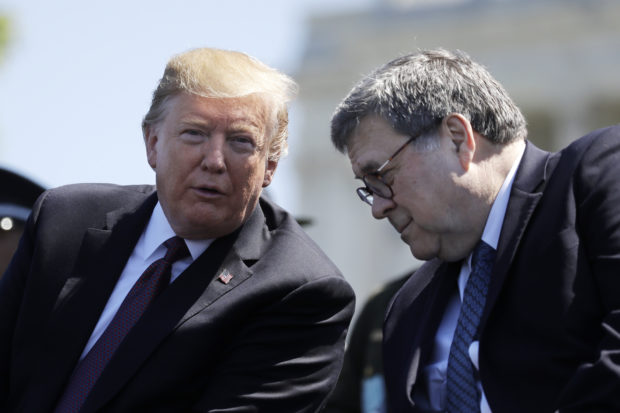Trump expands Barr power over classified Russia probe info
WASHINGTON – President Donald Trump has granted Attorney General William Barr new powers to review and potentially release classified information related to the origins of the Russia investigation, a move aimed at accelerating Barr’s inquiry into whether U.S. officials improperly surveilled Trump’s 2016 campaign.
Trump on Thursday directed the U.S. intelligence community to “quickly and fully cooperate” with Barr’s investigation of the origins of the multiyear probe of whether his campaign colluded with Russia.
Former intelligence officials and Democratic lawmakers criticized Trump’s move, which marked an escalation in his efforts to “investigate the investigators” as he works to undermine the findings of special counsel Robert Mueller’s probe .
Trump’s announcement came amid mounting Democratic calls to bring impeachment proceedings against him.

FILE – In this May 15, 2019, file photo, President Donald Trump and Attorney General William Barr speak at the 38th Annual National Peace Officers’ Memorial Service at the U.S. Capitol in Washington. Trump is directing the U.S. intelligence community to “quickly and fully cooperate” with Barr’s investigation of the origins of the multi-year probe into whether Trump’s 2016 campaign colluded with Russia (AP Photo/Evan Vucci, File)
Press secretary Sarah Sanders said in a statement that Trump is delegating to Barr the “full and complete authority” to declassify documents relating to the probe, which would ease his efforts to review the sensitive intelligence underpinnings of the investigation.
Such a move could create fresh tensions within the FBI and other intelligence agencies, which have historically resisted such demands.
Article continues after this advertisementTrump is giving Barr a new tool in his investigation, empowering him to unilaterally unseal documents that the Justice Department has historically regarded as among its most highly secret.
Article continues after this advertisementWarrants obtained from the Foreign Intelligence Surveillance Court, for instance, are not made public — not even to the person on whom the surveillance was authorized.
Trump explicitly granted Barr declassification power — noting it would not automatically extend to another attorney general — and only for use in the review of the Russia investigation.
Before using the new authority, Barr should consult with intelligence officials “to the extent he deems it practicable,” Trump wrote in a memo formalizing the matter.
The president has frequently claimed his campaign was the victim of “spying,” though the intelligence community has insisted it acted lawfully in following leads in the Russia investigation and conducted surveillance under court order.
Barr has already asked John Durham, the U.S. attorney in Connecticut, to examine the origins of the Russia investigation to determine whether intelligence and surveillance methods used during the probe were lawful and appropriate.
Still, Barr has been directly involved, according to a person familiar with the matter who was not authorized to discuss it publicly, and is working with CIA Director Gina Haspel, Director of National Intelligence Dan Coats and FBI Director Christopher Wray.
Wray vocally opposed the release by Congress last year of details from a secret surveillance warrant obtained by the bureau on a former campaign adviser, Carter Page.
The White House had eagerly encouraged Republicans on the House intelligence committee to disclose that classified information, believing it could help undermine the Russia investigation.
Wray, though cooperating with Barr in a review of the origins of the Russia probe, would presumably balk at declassifying classified information that could reveal sensitive sources or methods of investigators.
Former intelligence officials and Democratic leaders on congressional intelligence committees criticized Trump’s decision.
David Kris, former head of the Justice Department’s national security division, said it’s “very unusual — unprecedented in my experience — for a non-intelligence officer to be given absolute declassification authority over the intelligence.”
John McLaughlin, former deputy director of the CIA who served as acting director in 2004, tweeted: “Giving Barr declassification authority for this investigation is a really bad idea.
The agencies can cooperate but must retain their legal responsibility for protecting sources. Congressional intelligence committees need to stand in the door on this one.” /g